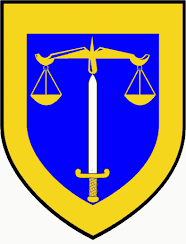The Lawsmiths
Founded in 456 TA by Nicholas the Justice Maker, the Lawsmiths are the creators and arbiters of merchant and guild contracts for much of the Western Reaches. Most of the order are clerics - called Examiners - who use their considerable power tyrannically to sway the flow of gold from commercial ventures ranging from slavery to coffee. Educated and ruthless, the Lawsmiths are feared by traders - oftentimes leading to tributes to Nicholas left by merchants in order to avoid the attention of the Examiners.
Those wishing to join the Lawsmiths should approach Jerome the Proud at the Counting House in Teufeldorf.
The Legend of Nicholas the Justice Maker
In the prosperity following the Orcish Wars, Teufeldorf thrived and the merchants of the City-State multiplied to meet the demands of a growing population no longer concerned with warfare and survival. With unbridled growth, however, came friction and ruthless competitiveness which was no more evident than in Tanner's Row. In 455 TA, the tensions between the five major tanners in the city erupted - first with theft and sabotage, culminating in a large fire that extensively burned a large section of the Merchant's Quarter.
Those guilty were brought before the newly-crowned King Lionel Longmane with the demands from the merchant nobility for justice and order. On Longmane's council was a young man by the name of Nicholas Wey - a silver-tongued orator and debater of great facility. Nicholas was handsome and tall, and he was also unashamedly greedy and self-promoting. Nicholas promised to negotiate a deal between the tanners that would solve the problem that had eventually led to the Tanner's Fire of 455 TA. During the following year, Nicholas established the first formal guild - creating a new set of laws that would bind both the merchants and the Crown to its tenets. Carefully slipped in amongst the piles of legal documents, Nicholas established fees that would be paid directly to him for his services. These fees were ongoing and payable by both the Crown and the newly-formed Tanner's Guild.
Over the next ten years, Nicholas managed to repeat this solution for the different guilds and merchants in the City-State. Each time, Nicholas created laws outside of the King, and he managed to escalate his fees until he was vastly wealthy with a large number of clerks and enforcers in his employ. His followers were called the Lawsmiths, and Nicholas was oftentimes referred to as the Justice Maker - for his work to save the City-State from anarchy following the fire.
In 466 TA, King Lionel Longmane was found dead in his private library in the castle. In the aftermath of his funeral, a successor was sought, and Nicholas stepped forward to take control. However, a handwritten note from the late Longmane had been found with the ominous title, If I Should Die. It outlined the late king's suspicion that Nicholas was attempting to murder him to seize control of Teufeldorf.
On October 30 466 TA, Nicholas Wey was beheaded in a public execution. Rumor holds that the orator continued to make a case for his life even as the axe severed his head. While the body was staged for a public burning, the head of Nicholas was stolen - some say by his followers. Several accounts say that the head is still in the Counting House in Teufeldorf where it gives advice to the senior clerics of the order. At the burning of the headless body, many witnesses claimed to have heard laughter from the flames - the sound of which caused a panicked riot of onlookers fleeing the scene.
With Nicholas gone, the Lawsmiths acted quickly to restore faith in their business. They established a clerical order - called the Examiners - to review business contracts and ensure their ethical tenets. While their fees were reduced, the order of Lawsmiths thrived - and survives even to this day. No longer creating laws directly, the Lawsmiths exert considerable control over the merchants, guilds and nobility of the Reaches.
